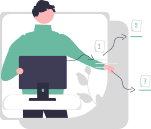The accounting software landscape is undergoing a profound transformation as artificial intelligence capabilities become increasingly embedded in financial management tools. Today's accounting programs are no longer simple calculators or digital ledgers—they're intelligent systems that can analyze data, identify patterns, make predictions, and even provide strategic recommendations. This evolution is reshaping how businesses handle their finances and how accounting professionals deliver value.
The Evolution of Accounting Software: From Calculation to Intelligence
The Traditional Accounting Program
For decades, accounting software served primarily as a digital replacement for paper-based bookkeeping systems. Early programs offered basic functionality:
- Recording financial transactions
- Generating standard financial statements
- Tracking accounts payable and receivable
- Managing payroll calculations
- Producing tax forms and reports
While these functions represented significant improvements over manual processes, they essentially mechanized existing accounting workflows rather than transforming them.
The AI-Enhanced Accounting Platform
Modern AI-integrated accounting programs go far beyond transaction processing, offering capabilities that were once the exclusive domain of skilled financial analysts:
- Intelligent Data Capture: Using optical character recognition (OCR) and machine learning to automatically extract and categorize information from receipts, invoices, and financial documents
- Anomaly Detection: Identifying unusual transactions or patterns that might indicate errors, fraud, or opportunities
- Predictive Analytics: Forecasting cash flow, revenue trends, and potential financial challenges based on historical data and market indicators
- Automated Reconciliation: Matching transactions across different accounts and sources with minimal human intervention
- Natural Language Interfaces: Allowing users to query financial data using conversational language rather than complex report builders
- Continuous Audit Capabilities: Monitoring transactions in real-time to ensure compliance and accuracy
"The difference between traditional accounting software and AI-enhanced platforms is like comparing a calculator to a financial advisor," explains Jordan Martinez, CTO of CloudFinance Solutions. "One performs calculations when instructed, while the other proactively analyzes your financial situation and offers guidance."
Leading AI-Powered Accounting Programs Transforming the Industry
Several established and emerging platforms are leading the AI revolution in accounting software:
Enterprise Solutions
SAP Intelligent Accounting SAP's accounting modules now incorporate machine learning algorithms that continuously analyze transaction data to improve accuracy and identify optimization opportunities. The system can automatically categorize expenses, match invoices to purchase orders, and flag potential compliance issues.
Oracle Fusion Cloud ERP Oracle's enterprise resource planning suite includes AI-driven accounting tools that provide predictive insights and automate routine processes. Its "Intelligent Process Automation" feature can identify patterns in accounting workflows and suggest efficiency improvements.
Small and Medium Business Platforms
QuickBooks Advanced with QuickSight AI Intuit has aggressively integrated AI capabilities into its flagship accounting platform. QuickBooks now offers cash flow predictions, anomaly detection, and automated categorization features powered by its proprietary QuickSight AI technology.
Xero with Analytics Plus Xero's cloud-based accounting solution now includes Analytics Plus, an AI-driven insights engine that analyzes business performance and offers recommendations for improving financial health and cash flow management.
FreshBooks with Spark FreshBooks has implemented its Spark AI assistant, which helps small business owners interpret their financial data, identify tax-saving opportunities, and forecast business performance without requiring advanced accounting knowledge.
Specialized AI Accounting Tools
Vic.ai Specializing in accounts payable automation, Vic.ai uses neural networks to process invoices with up to 99% accuracy, learn company-specific approval workflows, and identify potential duplicate payments or pricing discrepancies.
Botkeeper Focused on bookkeeping automation, Botkeeper combines AI algorithms with human oversight to deliver automated bookkeeping services that scale from small businesses to large enterprises.
Taxfyle AI This specialized platform uses artificial intelligence to streamline tax preparation, continuously updating its knowledge base to reflect changing tax codes and identifying potential deductions based on business transaction patterns.
The Impact on Accounting Processes and Workflows
The integration of AI into accounting programs is fundamentally changing how financial processes are executed:
Continuous Accounting vs. Period-End Closing
Traditional accounting software operated on a periodic basis, with month-end or quarter-end closing processes requiring significant manual effort. AI-enabled systems support "continuous accounting" where transactions are processed, analyzed, and reconciled in real-time.
"Continuous accounting enabled by AI has eliminated the month-end crunch that used to consume our entire finance team," notes Rebecca Chen, CFO of NexGen Manufacturing. "We now have real-time visibility into our financial position, and our team can focus on analyzing the data rather than just compiling it."
Exception-Based Workflows
Rather than requiring human review of every transaction, modern accounting platforms use AI to implement exception-based workflows. The system handles routine transactions automatically and only flags exceptions that require human judgment.
Predictive Resource Planning
Advanced accounting programs now incorporate predictive analytics to help organizations anticipate resource needs. By analyzing historical financial data and current trends, these systems can forecast cash requirements, staffing needs, and inventory levels with increasing accuracy.
Implementation Challenges and Considerations
Despite their transformative potential, implementing AI-enhanced accounting programs presents several challenges:
Data Quality and Integration
AI systems require clean, consistent data to function effectively. Many organizations struggle with data scattered across multiple systems, inconsistent formatting, and incomplete records. Successful implementation typically requires significant data cleaning and integration efforts.
Process Redesign Requirements
Extracting maximum value from AI-enhanced accounting programs often requires redesigning financial processes rather than simply digitizing existing workflows. This organizational change management aspect can be more challenging than the technical implementation.
Cost-Benefit Considerations
While AI accounting features offer significant benefits, they also come with costs beyond the software itself—including implementation services, staff training, and potential process disruption. Organizations must carefully evaluate the total cost of ownership against expected benefits.
Security and Control Concerns
As accounting systems become more automated, ensuring appropriate controls and security becomes increasingly important. Organizations must implement robust governance frameworks to maintain oversight of AI-driven accounting processes.
The Future: What's Next for AI in Accounting Programs?
The integration of AI into accounting software continues to accelerate, with several emerging trends likely to shape the next generation of solutions:
Blockchain Integration
Leading accounting software providers are exploring ways to integrate blockchain technology with AI capabilities to create immutable audit trails while leveraging machine learning for analysis and insights.
Natural Language Financial Reporting
Future accounting programs will likely generate narrative financial reports that explain key trends, challenges, and opportunities in plain language, making financial insights accessible to non-financial stakeholders.
Autonomous Finance Operations
The long-term vision for many vendors is "autonomous finance"—systems that can independently manage routine financial operations with minimal human oversight, allowing finance teams to focus exclusively on strategic decision-making.
Cross-Platform Intelligence Networks
As accounting AI matures, we're beginning to see the emergence of cross-platform intelligence networks where insights and patterns identified in one organization's financial data (anonymized and aggregated) can benefit other users of the same platform.
Preparing Your Organization for AI-Enhanced Accounting
Organizations looking to leverage AI-enhanced accounting programs should consider several preparatory steps:
- Assess Data Readiness: Evaluate the quality, consistency, and accessibility of your financial data across all systems.
- Define Success Metrics: Clearly articulate what success looks like for your AI accounting implementation, whether that's cost reduction, improved accuracy, or enhanced decision support.
- Start with Targeted Use Cases: Rather than attempting a comprehensive implementation, begin with specific high-value use cases such as accounts payable automation or expense management.
- Invest in Team Development: Ensure your finance team has the skills needed to work effectively with AI-enhanced systems, including data literacy and analytical thinking.
- Establish Governance Frameworks: Develop clear policies for how AI will be used in financial processes, including control mechanisms and oversight responsibilities.
Conclusion: The Intelligent Future of Accounting Programs
The integration of artificial intelligence into accounting software represents not just an evolution in technology but a fundamental shift in how financial management functions. These intelligent systems are redefining the relationship between financial data and decision-making, creating opportunities for organizations to operate with greater efficiency, accuracy, and strategic insight.
As AI capabilities continue to advance, the distinction between accounting software and financial advisory tools will increasingly blur. Tomorrow's accounting platforms won't just record what happened financially—they'll help explain why it happened and what should happen next.
Organizations that embrace these capabilities while thoughtfully addressing the associated implementation challenges will gain significant competitive advantages through better financial visibility, reduced operational costs, and more informed decision-making. The future of accounting isn't just automated—it's intelligent.




